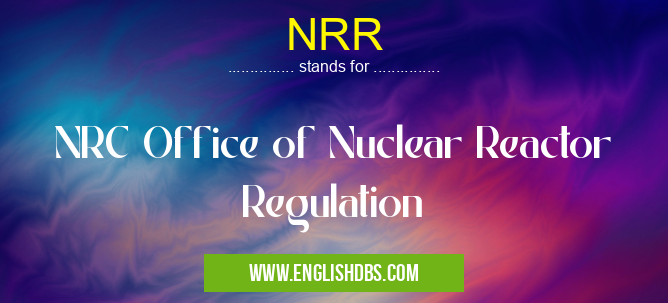What does NRR mean in US GOVERNMENT
Nuclear energy is one of the most powerful and potentially dangerous forms of energy available today, so it stands to reason that government organizations would require strict regulation and oversight of nuclear facilities. The NRC Office of Nuclear Reactor Regulation (NRR) exists within the United States Nuclear Regulatory Commission to provide just that. This office is tasked with the responsibility of ensuring safe operation of nuclear reactors and other related installations throughout the country. In addition to setting safety standards for these facilities, the NRR also conducts inspections and reviews to ensure compliance with regulations and laws

NRR meaning in US Government in Governmental
NRR mostly used in an acronym US Government in Category Governmental that means NRC Office of Nuclear Reactor Regulation
Shorthand: NRR,
Full Form: NRC Office of Nuclear Reactor Regulation
For more information of "NRC Office of Nuclear Reactor Regulation", see the section below.
Essential Questions and Answers on NRC Office of Nuclear Reactor Regulation in "GOVERNMENTAL»USGOV"
What is the NRC Office of Nuclear Reactor Regulation?
The NRC Office of Nuclear Reactor Regulation (NRR) is a part of the U.S. Nuclear Regulatory Commission responsible for ensuring safety and security at nuclear power plants throughout the United States. NRR administers licensing, inspects, and supervises nuclear reactors in order to protect public health and safety.
What are the responsibilities of the NRC Office of Nuclear Reactor Regulation?
The NRC Office of Nuclear Reactor Regulation oversees all aspects of nuclear reactors in the United States. This includes licensing, registration, compliance audits, and enforcement measures to ensure the safe operation and management of nuclear power plants. They also provide technical guidance to utilities operating nuclear power plants.
Who works at the NRC Office of Nuclear Reactor Regulation?
Professionals from all different backgrounds make up the staff at the NRC Office of Nuclear Reactor Regulation. These include engineers, scientists, lawyers, safety professionals, environmental analysts, financial experts, public health specialists and other support personnel who work together to ensure that nuclear power plants are operated safely and securely across America.
How does the NRC Office of Nuclear Reactor Regulation protect public health and safety?
The NRC Office of Nuclear Reactor Regulation sets standards for safe operation at reactor sites through license conditions and requirements on control systems and procedures that operators must adhere to in order to ensure public health and safety. Their inspections assess operational performance against these requirements to assure compliance over time.
What role does enforcement play in regulation?
Enforcement plays an important role in regulation by providing a deterrent effect when violations are detected or suspected so that corrective actions can be taken quickly by operators without further delay or risk to public health or safety. The NRC Office of Nuclear Reactor Regulation also imposes civil penalties when warranted by law.
What kind of regulations does the office implement?
The NRC Office of Nuclear Reactor Regulation enforces federal regulations related to design approval for new nuclear reactors, construction authorization for new facilities, operational licensing requirements for existing facilities, emergency preparedness planning matters related to security concerns when necessary as well as other regulatory activities designed to ensure safe operations.
Does this office regulate spent fuel storage facilities?
Yes it does. Fuel storage areas are governed by specific regulations established by the office which are designed to ensure their proper maintenance so that radioactive waste is stored safely away from people or natural resources such as ground water supplies.
Are plant designs subject to review before they can be approved?
Yes they are. Designs have to meet certain technical requirements set forth by both international standards as well as those established by the office before they can be approved for use in new reactor construction projects.
Does this office offer any educational programs or resources related its work?
Yes it does! The office offers several web-based educational resources such as fact sheets which provide helpful information on atomic energy production as well as newsletters highlighting current developments in regulation practice both domestically and abroad.
What factors influence decision-making within this organization?
Many factors come into play when decisions need to be made within this organization including considerations like cost effectiveness analysis, industry trends based on research data gathered from across multiple industries worldwide, legal implications associated with changes in policy or procedure etc
